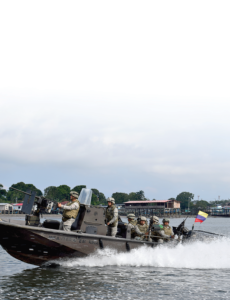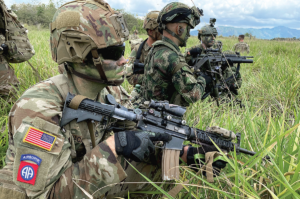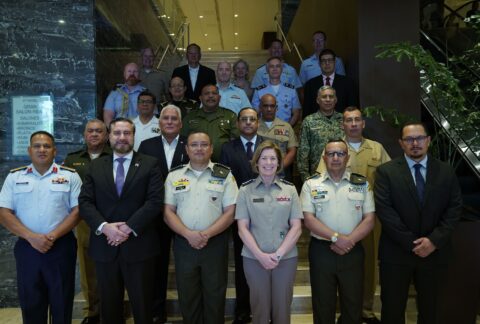Since the Constitution of 1991, Colombia has become a social state under the rule of law; that is, the state must ensure the integrity of citizens, and therefore, the country’s sovereignty rests with the people. It is a state with a democratic political system that has developed successfully in recent years despite internal violence; its political institutions are among the most stable in the region, and, in general, it has one of the most extensive electoral traditions, with leaders who have not abused the system in political terms. In addition, one of the crucial factors in the fight against organized crime has been strategic intelligence, which, when strengthened, maximizes the power of the state itself, allowing the adoption of a preventive concept that anticipates any potential threat, both internal and external, and the creation and consolidation of a national security policy.
Cooperation with the United States
Consequently, Colombia has committed to and has strengthened bilateral cooperation with the United States, by reviewing, sharing, and using the necessary strategic intelligence to counter transnational crimes, preserve sovereignty, and promote the importance of maintaining regional stability. This strategy has included anticipation, information management, education, and updates on threat response by developing appropriate and currently in force security and defense plans.
In the face of imminent violence, both individuals and states can defend themselves with anticipation and justly; they can shoot first if they know they are about to be attacked, even if it hasn’t happened yet. This is a power recognized in states’ internal laws and in the legal paradigm applied to international society.
The Colombian case

the Pacific Ocean. (Foto: Oficina de Comunicaciones Estratégicas del Comando General de las Fuerzas Militares de Colombia)
Concerning the Colombian case, given the different security policies undertaken by recent governments, the theory of preventive war can be considered the model that has been used in the country to prevent, anticipate, and take initiative in the face of a terrorist threat to restore order and security, as essential elements to guarantee the protection of citizens in a situation of violence. This situation can fall under the concept of “new wars,” characterized by de-ideologization, the absence of territorial control, the funding of illegal activities, and the use of acts of terrorism as methods and means of combat.
Recent governments have designed public security policies based on intelligence and the concept of preventive war, seeking to commit not only the public force, but also other state institutions and citizens. This is one of the pillars of political agendas and national strategy, where public order management is not exclusive to the military, but follows the orders of the president as commander-in-chief of the Military Forces, or his delegate, the Defense minister.
Information management
Traditional confrontations between states have decreased, while new transnational dynamics have increased. These work in chains, operating through links in different regions of the world, as in the case of narcotrafficking, where a drug produced in South America goes through Central America to be finally commercialized and consumed in prosperous countries of the north and other parts of the world. Therefore, solving problems that affect entire continents requires international cooperation, as well as a strategic approach to solving global issues.
Although many authors argue that conflict, rather than cooperation, is more likely in international relations than interstate relations, terrorism and transnational crime have led the United States to opt for new forms of international cooperation.
Universal crime-related conventions encourage member states to sign bilateral and multilateral agreements to increase the effectiveness of international cooperation. However, in terms of intelligence, the issue is not so simple, as the exchange of information can often be limited to certain topics, in addition to the difficulty and wariness of sharing an element that has cost money, effort, and even lives. But when cooperation takes place in matters of strategic intelligence, it becomes permanent, demarcating a specific scenario like in Latin America, where intelligence cooperation took place during the East-West Conflict, as part of a hemispheric bloc. When this conflict concluded, and after the restoration of the democratic system in those affected countries, especially in South and Central America, this cooperation became subregional and part of public security.
Education and updates

Since mid-2000, Colombia has received requests for security cooperation from different governments in Latin America and the rest of the world — due to the experience it gained in the fight against narcotrafficking, organized crime, and counterinsurgency. Today the country continues to exchange and update experiences and doctrine to improve operational procedures.
With U.S. support, Colombia was promoted as a security “exporter” through the U.S.-Colombia High-Level Strategic Security Dialogue in February 2012. Months later, the presidents of both nations announced an Action Plan on Regional Security Cooperation at the Summit of the Americas, in Cartagena, to build capabilities in Central America and the Caribbean, creating a Coordination Group for Security Cooperation and a Division of International Cooperation at the U.S. Embassy in Bogotá, assigned to the Bureau of International Narcotics and Law Enforcement Affairs and to U.S. Southern Command.
Under the premise that shared responsibility and reciprocal action are decisive in addressing transnational organized crime, both governments have worked to exchange solutions, institutionalizing and strengthening this strategy, wherein efforts from Washington have increased, with the creation of the International Cooperation Division in Bogotá.
Thus, it can be determined that the review of U.S.-Colombian strategic intelligence has enabled countries to anticipate various transnational crimes, especially narcotrafficking (see chart). But more international cooperation is required, with the inclusion of various multilateral organizations, where information exchange mechanisms are proposed to achieve greater effectiveness in neutralizing and affecting transnational organized crime.
It is worth noting that defense and security policies adopted by the last four Colombian presidents have largely managed to integrate all areas of power, and have also contributed to empowering intelligence as a decisive factor that maximizes power to fight transnational crime.









